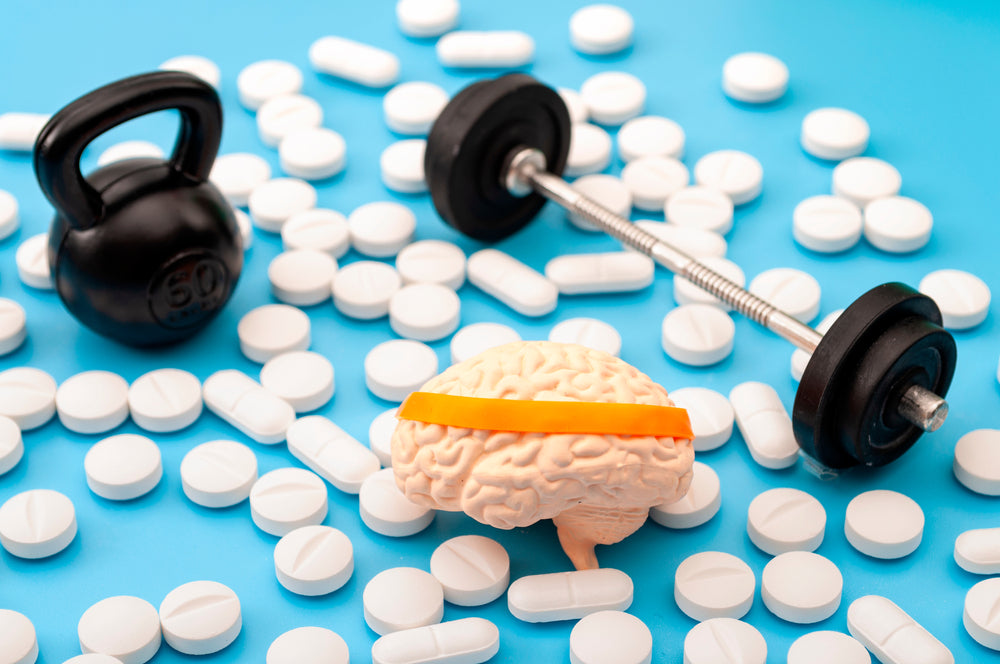Nootropics are called "smart drugs" because they have positive effects on our brains more so than our bodies. Enhanced mental clarity and concentration are the most beneficial symptoms, although some people take them for anxiety and depression.
The most obvious nootropic is caffeine, which most of us get from tea and coffee. Other nootropics like lion's mane and L-theanine have the same effects, albeit with unique quirks.
Nootropics work by altering the chemicals or chemical messengers in the brain, stimulating neurons and opening pathways that regulate our mood, concentration, and mental ability. It sounds great, but is the smart moniker over the top?
The Origin of "Nootropic"
The term "nootropic" was coined in 1972 by Romanian psychologist and chemist Corneliu Giurgea from the Greek word "nous", meaning "mind", and "trepein", meaning "to turn."
Giurgea was interested in developing therapeutics to treat cognitive deficits from disorders like dementia, stroke, and trauma, so he formulated a list of criteria that compounds must meet to be considered true nootropics:
- Enhancing memory and ability to learn.
- Increasing the brain's resistance to injuries.
- Lacking sedative or stimulant effects.
- Protecting overall brain health.
Drugs like Giurgea's piracetam [1] that enhanced neurological function - especially memory and learning - while avoiding side effects were the original class of nootropics. However, the definition has expanded over time.
Today's Expansive Definition

In contemporary terms, a nootropic is any natural or synthetic compound that boosts cognitive performance in healthy individuals. This could include enhancing the following:
- Motivation and attention span.
- Focus and mental clarity.
- Learning ability and memory recall.
- Mood and stress resistance.
- Neurological efficiency and neuroprotection.
Most lists of natural nootropics include botanicals and fungi like ginseng, rhodiola, lion's mane, and bacopa.
Nutraceuticals like L-theanine, creatine, and choline compounds are examples of nootropics the human body can't produce on its own.
Even nutrients like omega-3 fatty acids and antioxidants fall under the nootropic umbrella, provided they positively affect the brain.
Then, we have nootropic super blends like nootropic coffee, which combines natural caffeine with other nootropics for greater mental focus.
The Best Smart Drugs

Lion's mane
Lion's mane is an edible mushroom that grows on dead hardwood with a pom-pom-like appearance. It contains bioactive compounds like hericenones and erinacines [2] that get to work in your brain, stimulating the growth of new neurons and increasing the levels of BDNF, a protein that supports the health and function of your brain cells.
The anti-inflammatory and antioxidant properties of Lion's Mane also protect your brain from oxidative stress [3] and can boost immunity.
To experience the benefits of lion’s mane try the following products:
L-theanine
L-theanine is a natural amino acid extracted from the leaves of some tea plants. It affects the brain's alpha frequency band to promote relaxation [4]. Intake can enhance attentional abilities and working memory/executive functions in middle-aged and older adults, likely by modulating brain wave patterns and attentional allocation.
Another study [5] found that L-theanine can positively influence visual and auditory attentional abilities as well as promote relaxation (increased alpha waves, decreased heart rate) in individuals with higher anxiety propensity.
Try our vybey Brain Smart Focus as a coffee alternative without the jitters and anxiety from caffientated beverages.
Natural caffeine
Caffeine triggers adenosine A1 and A2A receptors in the brain [6], increasing the release of dopamine, glutamate, and other neurotransmitters involved in arousal, cognition, and motor activity to enhance attention and reaction times.
Some epidemiological evidence also links moderate caffeine consumption to reduced risk of Alzheimer's and Parkinson's disease, potentially due to neuroprotective effects.
Our vybey Brain Smart Focus contains natural caffeine alongside l-theanine when combined can provide added levels of cognitive performance [7], no caffeine crashes [8] and your blood flow [9].
How to Boost Your Brain's Horsepower

If nootropics are akin to engine tuning, healthy lifestyle habits are your vehicle's core engineering and design.
Taking nootropics can improve sleep, exercise, stress management, and other daily patterns, giving your brain's "horsepower" the biggest upgrade.
Standardised extracts, delivery technologies, and well-researched complementary compounds like lion's mane and L-theanine can amplify benefits like focus, memory, and cognitive longevity.
It's safe to take nootropics every day, provided you follow the dosing instructions on the product label. But there's no shortcut around the fundamentals. You can't just pop a bunch of "smart drugs" and expect optimal performance from a depleted brain and body.
Nootropics work best as part of a broader regimen to nurture cognition alongside vitamins and minerals like magnesium, zinc, copper, and B vitamins. B vitamins play a critical role in brain health and complement nootropics [10] by metabolising glucose to produce energy for the brain and produce new neurotransmitters.
The 'Limitless' Scenario

In Limitless (2011), the fictional drug NZT-48 gives the main character, Eddie Morra, incredible cognitive abilities - perfect recall, superhuman focus, and the ability to process information at lightning speed. He goes from a struggling writer to a financial mastermind and potential presidential candidate, all thanks to this wonder pill.
It makes for an entertaining sci-fi thriller premise, but it's also pure fantasy compared to actual nootropics or "smart drugs."
For starters, nootropics like lion's mane are not drugs – they are foods and supplements – and no real nootropic can open up 100% of your brain's potential. In reality, the effects are much more modest, providing a moderate boost to certain cognitive functions like memory, attention, motivation, and information processing.
It's best to view nootropics as gentle cognitive enhancers rather than infinite mental upgrades. They don't radically expand your overall capabilities but can allow you to operate at peak performance for longer periods. But you'll still be working within the limitations of your fundamental cognitive hardware and biochemistry.
Summing Up
Nootropics earn their "smart drugs" name by enhancing some areas of cognitive performance over a short period – attention, focus, and mental clarity are the big three effects quoted by users.
You can take some nootropics from foods like lion's mane in their raw or extract form with a supplement like vybey Lion's Mane, which contains Lion's Mane Mushroom Fruiting Body Extract 10:1, or as part of a nootropics blend like vybey Braincare Smart Focus – this contains caffeine and L-theanine for a heavy nootropics hit.
Taking nootropics is perfectly safe, and it could be the difference between stumbling through the day with brain fog or sailing through it with mental clarity.
Sources

Back to vybey blogs